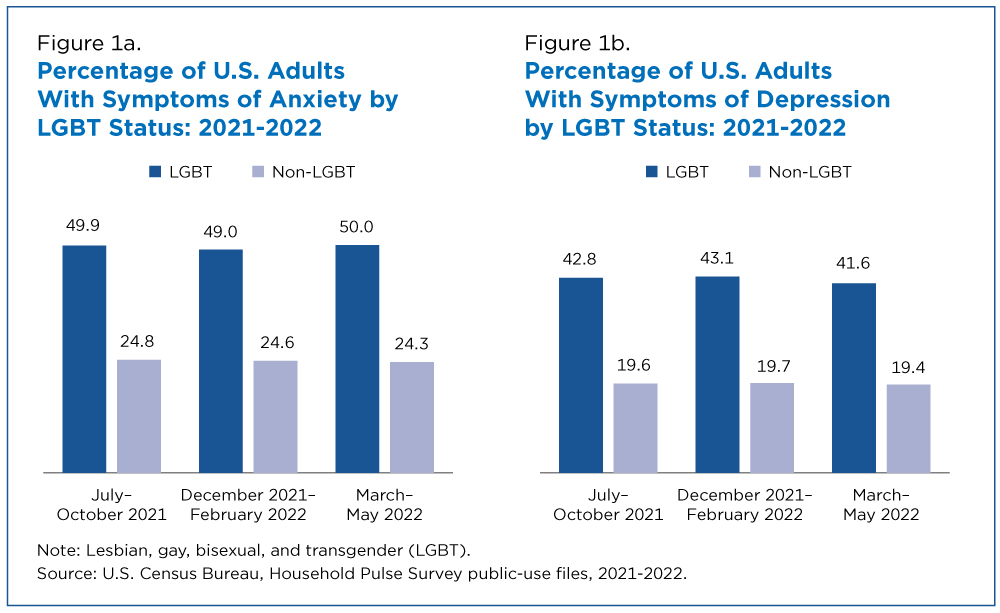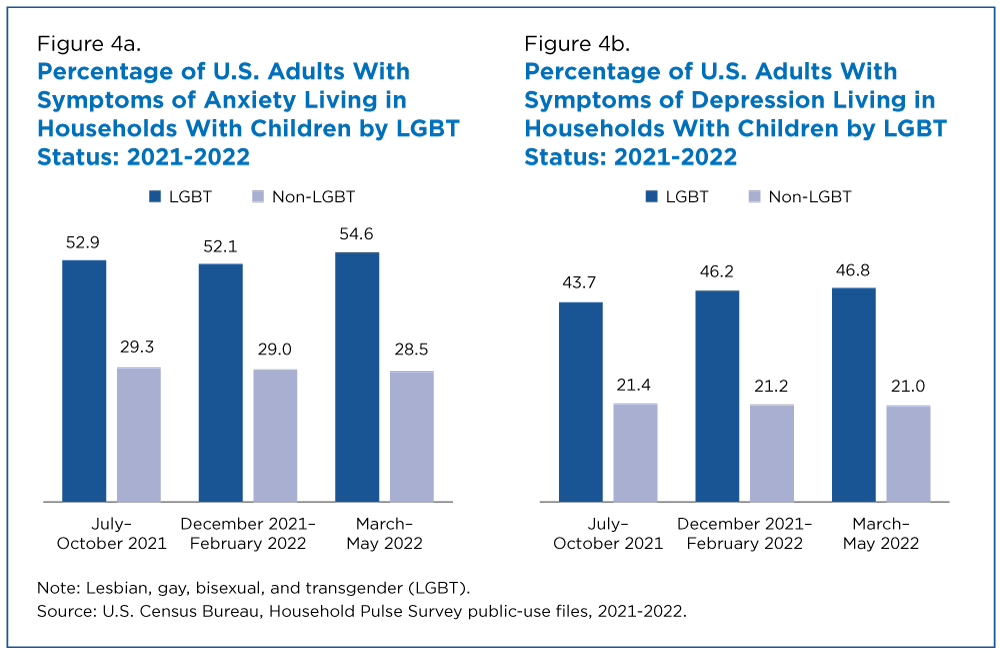The study results begin with: "Regardless of Household Type, LGBT Adults Struggled More With Mental Health Than Non-LGBT Adults."
Lesbian, gay, bisexual, and transgender (LGBT) adults have consistently reported higher rates of symptoms of both anxiety and depression amid the coronavirus pandemic than non-LGBT adults, according to U.S. Census Bureau data.
The results were the same regardless of the period in question: LGBT adults ages 18 and older reported roughly twice the rate of mental health challenges as non-LGBT adults.
A closer look at the problem...and how should Christians respond?
Be informed, not misled.
US Census Bureau: LGBT struggles more with mental health.
Lesbian, gay, bisexual, and transgender (LGBT) adults in the United States are about twice as likely as non-LGBT adults to suffer from “mental health challenges,” according to the U.S. Census Bureau.
“LGBT adults ages 18 and older reported roughly twice the rate of mental health challenges as non-LGBT adults,” the Census Bureau said in a release published on June 16.
These results come from the Census Bureau’s Household Pulse Survey, which started in April 2020 after the beginning of the COVID pandemic, and which last July began asking respondents about their sexual orientation.
Overall, in surveys conducted from March through May of this year, 50.0 percent of LGBT adults said they had symptoms of anxiety, while only 24.3 percent of non-LGBT adults said they had symptoms of anxiety.
According to the survey's data from March through May of this year, 54.6 percent of LGBT adults with children in their households said they had symptoms of anxiety. That compared to 28.5 percent of non-LGBT adults with children in their households who said they had symptoms of anxiety.
At the same time, 46.8 percent of LGBT adults with children in their homes said they had symptoms of depression, while only 21.0 percent of non-LGBT adults with children in their homes said they had symptoms of depression.
Boston University Research admits that "COVID is a great threat to the LGBT community."
How should biblical Christians respond?
It's difficult because the homosexual agenda dominates the culture today. The entire month of June is dedicated primarily to celebrating the behavior. If a person fails to do so or doesn't respond properly they are automatically labeled a bigot. Or worse.
Gary Hamrick, the senior pastor of the 10,000-member Cornerstone Chaple in Leesburg, Virginia decided because this issue has become so dominant in our culture that he would take time to address some of these questions.
This is a link to the YouTube video of some of his "question and answer" time with the congregation.
About your own children.
During the discussion, one person asked how parents can guard their children against "the push for the acceptance of sexual fluidity in their generation and future peer groups."
"It's unavoidable. All you can do as parents [is] pray a lot for your kids. And it is OK to shelter them as best as you can," Hamrick replied. "You do your best and you trust God to protect their hearts and their minds in Christ Jesus."
Hamrick said parents will often expose their children to ideas of gender fluidity and sexuality too early because they are fearful their children will be too "sheltered" from "the real world."
"You can shelter your kids as best as you can. And they're still going to eventually have to come to grips with the evils of the world. But you don't have to expose them at an early age. That's what's key," Hamrick said. "When kids get exposed to things at an early age, that's where it's much more detrimental."
Hamrick encouraged parents to direct their kids to Bible passages such as Genesis 1:27 which reads, "God created mankind in his own image, in the image of God he created them; male and female he created them."
About friends who practice LGBT behavior.
Another audience member asked: "How should Christians respond to LGBT friends who argue: 'Love is love.'"
Hamrick replied, "If you really believe the Bible is the basis for your belief system, then you are going to recognize that God calls homosexuality sin."
"And if you operate from that standard, from that description, from that definition, then it's a matter of 'how do I communicate truth In love?'" he said.
"Being loving is not denying the truth. That's a very unloving thing. Being loving toward somebody is figuring out a sensitive way to communicate the truth. It's a very unloving thing to say: 'Well, I'm just going to affirm them and not really tell them the truth.' So you're not doing them any good, and you're not being honest before the Lord or to yourself."
Hamrick believes that "the Church has not done a very good job on this topic of homosexuality" because they fall into two "extremes."
"[Churches are] either really harsh against homosexuals, or they're ... really affirming and [claim that] 'it's no big deal and God loves everybody,'" Hamrick said.
"And the truth is, it's really easy to live in the extremes of life and to live in extreme conversations. I mean, that's easy. What's hard is to find that balance in the middle where you're communicating the truth in love. And to affirm somebody in their sin is just lying to them."
The consequences for speaking the truth in love.
Hamrick said Christians might face backlash when sharing the Bible's stance on homosexuality but encourages them to stand strong.
"They may not accept it. … But that's not on you. What's on you is 'how can I communicate this with sensitivity and love, without affirming what is wrong?'" Hamrick said.
He stressed that sharing the truth about the Bible's stance on sexuality can be challenging because "our world and our culture has now affirmed something that God does not."
"It's really easy to confront someone, even if you do it in a loving way, about something that the culture and God both agree on" but challenging when "the culture is saying the opposite," Hamrick said.
"Just the fact that you might hold the belief that homosexuality is wrong, you're going to be labeled a hater, intolerant, a bigot," he warned.
"You can't control that. All you can control is: 'I want to honor God and I want to always be truthful, and so I'm going to look for a gentle and sincere way to communicate truth when necessary when it comes up."
Be Informed. Be Discerning. Be Engaged. Be Loving. Be Prayerful.



